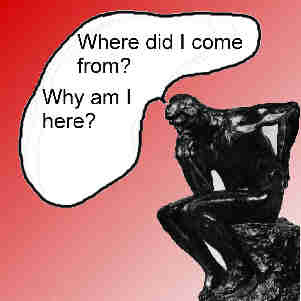Goals:
- Understand the role that Darwin plays within the idea of diversity and fit that into our daily lives
- To consider once again our relation to nature: Darwin vs. spirituality, our relationship with animals and plants
- To begin our debate on Darwin's theories vs. a spiritual approach to nature
- This is the last discussion of the semester, so I wanted to tie together all the loose ends: starting with natural selection and the origin of species and ending in death.
1. Obviously a diverse atmosphere here on campus. Name weird things seen this past week, the weirdest thing you have seen this semester…
2. Darwin’s ideals of natural selection: Can anyone explain briefly what these are?
o Skaggs: “‘The most vigorous and healthy… must generally gain the victory in their contests’ of survival. This means that there are more factors than simply strength and intelligence that determine the survival and continuance of a certain organism. Their sexual appeal and ability to produce offspring is also important. It doesn’t do an antelope much good to be fast enough to escape the lion only to be so ugly that no one will mate with it…. It is the elegant simplicity of Natural Selection which makes the idea so convincing to me.”
o Saumya: “It makes sense. The strongest (fittest) make it through tough conditions.”
o Kristen: “In Wallace’s paper, published in 1858, “On the Tendency of Varieties to Depart Indefinitely from the Original Type,” he attempts to prove ‘that there is a general principle in nature which will cause many varieties to survive the parent species, and to give rise to successive variations departing further and further from the original type.’ But because we do not generally suffer from animal overpopulation, there must be some sort of limiting factor. Those that can survive better do, and those who are less able to survive do not.”
3. Everyone obviously has their own opinions about natural selection, but as Skaggs pointed out, most the conflict comes with Darwin’s theory on evolution and origin. Would anyone like to share their beliefs? Or maybe the beliefs that they were raised with?
o Saumya: “Contrary to Kristen's home, mine was one of full support for the theory of evolution. My dad, the "believer in science" definitely supports Darwinian views. My dad would use the "survival of the fittest" idea to motivate me to do well in all aspects of life.”
o Skaggs: “I’m very much in favor of the idea of Natural Selection and I tend to support Evolution…”
o Kristen: “I believe that God's word is true and that He did create the world we live in. But that is not to say that he did not use evolution as His means to an end… Although Genesis states that God created everything in seven days, Peter states that ‘one day is with the Lord as a thousand years, and a thousand years as one day.’[2] This statement claims that God’s concept of time is different to ours.”
o Kajal: “Therefore, my little theory constitutes that God controls everything… But in all reality, I know nothing.”
4. How does the idea of diversity play into Darwin’s work? Apply to our surroundings: Austin, UT campus (nature- plants and animals), and the people we find here.
o Survival of the fittest (JUDE) vs. compassion and sympathetic imagination
i. Austyn: “Self-preservation- not in the literal sense, rather in the ideal sense- wewant to be on top, and, when we’re too old and decrepit to maintain that position, we want someone to hold it for us. That someone would be our offspring.”
ii. Jenny: “However, for the homo sapien, a physical impediment does not mean the end of his/her gene contribution in the world. Because we have developed technology,”
o How do we feel about ancestors as animals? (from museum tour)
5. Alice and Diversity: What are some examples of diversity in Alice that we can apply to our lives and to Darwin’s theory?6. As Saumya discussed, what traits (of those we have studied this semester) do you feel are most important when looking to create the “fittest” person, the “most evolved?”
o Saumya: “Intelligence - the ability to analyze the world around you as well as history. An education is necessary for this (this involves a strong left and right brain).Compassion - the ability to have empathy for others. This may not seem like a vital key to survival but because humans are social animals, it is.Sympathetic imagination - the ability to connect, to other people, to animals, to nature.”
o Austyn: ““We strive to be the best we can, and, translated into our current standards, that means the wealthiest and, though some could argue, the most beautiful. However, why do we do this?”
o Examples of Traits/Ideas we have studied: Compassion, Sympathetic imagination, Left- Right Brain mastery, Unity, Education, Leadership, Meditation
7. How does this fit in with the “new persona” we are trying to create for ourselves?
o Diversity as a virtue
8. As we create our “new persona” we must deal with the idea of death. If we consider evolution we must consider time, and that brings us to the idea of death (or the absence of time in our life)…Go to page X: 1004. Answer the question “Why?”
o Kristen: “The rocks that make up the building around campus contain the “skeletons and ghosts”[5] of those that walked this earth before us. And like Newt, I also find comfort in knowing that death and the fear of death is a common emotion between all of humanity. The idea that dying has been going on for generations and that it is the natural progression of life instead of something to fear holds a certain amount of comfort.”
o Skaggs: “Evolution is not observable on any timeline that we humans are capable of understanding. Given a long enough timeline (say millions to billions of years, a timeframe we cannot even begin to fathom as humans who live mere decades), evolution will begin to seem far more probable and believable.”









